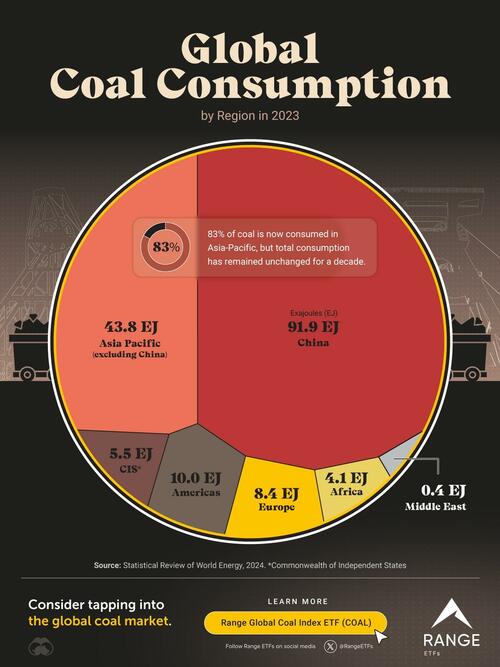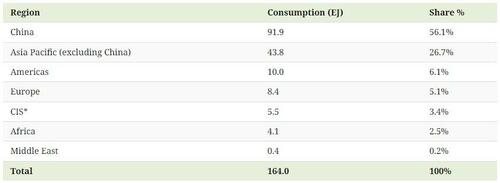
Despite many nations transitioning away from fossil fuels, in 2023, world coal consumption reached a staggering 164 exajoules (EJ) of energy, a record high for any year.
For this graphic, Visual Capitalist's Alan Kennedy has partnered with Range ETFs to explore the role coal plays in the global energy mix and determine which regions still consume large quantities of coal.
The Role of Coal in Global Energy
Coal is a significant player in the global energy mix, contributing 26% of the world’s energy in 2023, more than all non-fossil fuel sources combined. The only energy source that contributed more to the global energy mix was oil.
Here’s how that consumption breaks down by region:
Percentages may not sum to 100 due to rounding. *Commonwealth of Independent States
Coal consumption has decreased in many regions. For example, both North America and Europe reduced their energy consumption from coal by 16% in 2023. However, a heavy reliance on coal in the Asia Pacific region has led to global coal consumption remaining essentially the same over the past 10 years.
In 2023, China increased its coal consumption from 88 EJ to nearly 92 EJ—totalling 56% of global coal consumption. This contributed significantly to Asia Pacific leading the world with a staggering 83% of global coal consumption.
The Importance of Coal
Easy access to existing infrastructure and reasonable prices have not only sustained global coal consumption over the last 10 years, but also paved the way for potential growth. Many developing nations are now expanding their coal consumption, presenting potential opportunities in the coal market.
For example, as per the Statistical Review of World Energy 2024, between 2022 and 2023, Bangladesh and Colombia saw double-digit percentage increases in year-over-year coal consumption: 41% and 53%, respectively.
Coal continues to play a critical role in the global energy mix, especially in the developing world, where its affordability makes it the current energy source of choice.
Despite many nations transitioning away from fossil fuels, in 2023, world coal consumption reached a staggering 164 exajoules (EJ) of energy, a record high for any year.
For this graphic, Visual Capitalist’s Alan Kennedy has partnered with Range ETFs to explore the role coal plays in the global energy mix and determine which regions still consume large quantities of coal.
The Role of Coal in Global Energy
Coal is a significant player in the global energy mix, contributing 26% of the world’s energy in 2023, more than all non-fossil fuel sources combined. The only energy source that contributed more to the global energy mix was oil.
Here’s how that consumption breaks down by region:
Percentages may not sum to 100 due to rounding. *Commonwealth of Independent States
Coal consumption has decreased in many regions. For example, both North America and Europe reduced their energy consumption from coal by 16% in 2023. However, a heavy reliance on coal in the Asia Pacific region has led to global coal consumption remaining essentially the same over the past 10 years.
In 2023, China increased its coal consumption from 88 EJ to nearly 92 EJ—totalling 56% of global coal consumption. This contributed significantly to Asia Pacific leading the world with a staggering 83% of global coal consumption.
The Importance of Coal
Easy access to existing infrastructure and reasonable prices have not only sustained global coal consumption over the last 10 years, but also paved the way for potential growth. Many developing nations are now expanding their coal consumption, presenting potential opportunities in the coal market.
For example, as per the Statistical Review of World Energy 2024, between 2022 and 2023, Bangladesh and Colombia saw double-digit percentage increases in year-over-year coal consumption: 41% and 53%, respectively.
Coal continues to play a critical role in the global energy mix, especially in the developing world, where its affordability makes it the current energy source of choice.
Loading…






